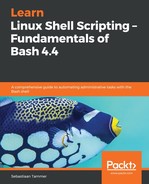We've learned about many things in the world of shell scripting so far: variables, conditionals, loops, redirections, and even functions. In this chapter, we'll explain another important concept that is closely related to shell scripting: scheduling.
Simply put, scheduling is making sure your commands or scripts run at certain times, without the need for you to personally start them every time. A classic example can be found in cleaning up logs; often, older logs are no longer useful and take up too much space. For example, you could fix this with a cleanup script that removes logs older than 45 days. However, such a script should probably be run once a day. On a workday, this shouldn't pose the biggest problem, but having to log in during the weekend is no fun. Actually, we should not even consider this, since scheduling allows us to define when or how often a script should run!
In Linux scheduling, the most commonly used tools are at and cron. We'll first describe the principles of scheduling using at, before we continue with the much more powerful (and because of that, more widely used) cron.
